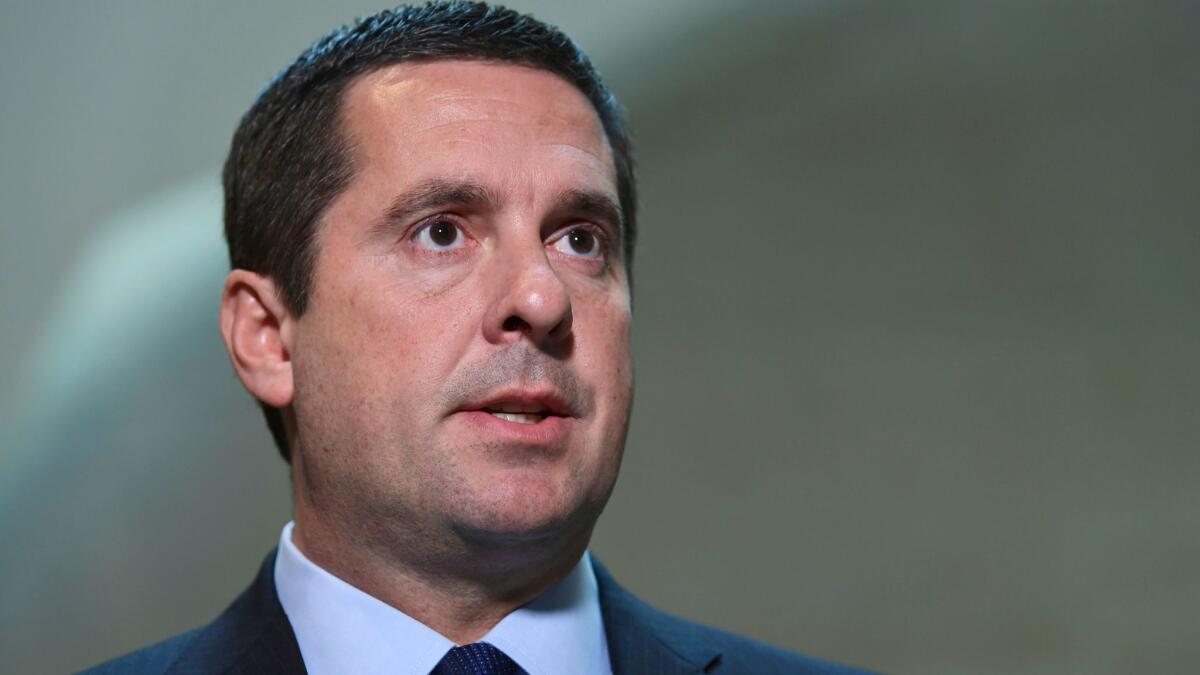No, Republicans, ‘deep state’ diplomats didn’t sabotage Trump’s Ukraine policy

- Share via
Republicans on the House Intelligence Committee have adopted a shotgun approach in defending President Trump against ever more credible accusations that he abused his power.
The accusations are relatively straightforward: that Trump pressured Ukraine to conduct investigations that would benefit him politically, including a probe of his rival, former Vice President Joe Biden. The grab bag of Republican rationalizations are all over the map. They include the argument that the president was not engaged in political dirty tricks but was sincerely concerned about widespread corruption in Ukraine; that he had reason to believe that Ukrainians had interfered in the 2016 U.S. election to oppose his candidacy; that he exerted no pressure in a telephone call in which he asked the president of Ukraine, a country desperately in need of aid from the United States, to “do us a favor”; that testimony linking Trump to a possible quid pro quo was “hearsay”; and, finally, that security assistance for Ukraine was eventually released, so Trump can’t be faulted — let alone impeached — for holding it up.
Some of these defenses crumble under the weight of their own implausibility. For starters, since when has Trump cared about corruption in Ukraine or anywhere else? Others have been convincingly contradicted by witnesses. For example, Fiona Hill, a Russia expert who worked for the National Security Council, demolished the notion that Ukraine systematically interfered in the U.S. election the way the intelligence community concluded that Russia did.
But there is one argument advanced by Republicans that touches on an important issue about how this country is governed — the notion that professional government employees who have testified in the inquiry might be usurping or undermining the president’s right to make foreign policy decisions. It’s a conspiracy theory that resonates with Trump supporters who already have accepted the kindred conspiracy theory that Trump is the victim of a sinister and power-hungry “deep state.”
Here is how Rep. Devin Nunes (R-Tulare), the top Republican on the Intelligence Committee and Trump’s most ardent apologist, put it during the hearings: “Though executive branch employees are charged with implementing the policies set by our president, who is elected and responsible to the American people, elements of the civil service have decided that they, not the president, are really in charge.” Nunes was echoing a list of Republican talking points that referred to “unelected and anonymous bureaucrats” who disagreed with Trump’s decisions.
That accusation is grossly unfair, and it betrays Nunes’ warped view of what it means to be a public servant. Career government officials told the Intelligence Committee, with far more credibility than Nunes, that they were advancing a Ukraine policy that had been endorsed by Trump and his key appointees: supporting that country against Russian incursions and encouraging its anti-corruption efforts. Marie Yovanovitch, who was recalled by Trump as ambassador to Ukraine, testified that “my job was to implement the foreign policy interests of this nation as defined by the president and Congress and to do so regardless of which person or party was in power.”
At the same time, the witnesses’ accounts demonstrated that there were two Ukraine policies — one that adhered to the administration’s stated objectives for Ukraine and one that involved what Hill aptly described as a “domestic political errand,” to wit, pressuring the Ukrainians to announce the investigations Trump sought into Biden and Ukraine’s role in the 2016 election. Testimony also showed that there was sometimes an overlap between the two policies. U.S. Ambassador to the European Union Gordon Sondland, a Trump political appointee, told the committee that major officials including Secretary of State Michael R. Pompeo were “in the loop” about his efforts to persuade Ukrainian President Volodymyr Zelensky to undertake the investigations Trump wanted.
Trump is notoriously inattentive to policy details, and it isn’t clear that he always understands the policies he signs off on. He’s also erratic, changing course on what seems like a whim. Conscientious officials can’t be blamed for assuming that the operative policy is the official one — not a corrupt “shadow” policy.
That said, where Trump has been clear and persistent about his foreign policy initiatives — even those with little support from the Foreign Service, military commanders or his political appointees — those decisions have been carried out. The U.S. repudiated the Iran nuclear deal and moved the U.S. Embassy in Israel to Jerusalem. U.S. forces were redeployed away from the Syrian border with Turkey, even though that set the stage for a Turkish attack.
The dedicated professionals who testified in this inquiry, including some who have been maligned by Trump, represent the best traditions of government service. The claim that these civil servants are usurping presidential prerogatives is utterly unpersuasive. What the hearings do demonstrate is that we desperately need to elect a president who doesn’t see foreign policy as a way to settle personal or political scores.
More to Read
A cure for the common opinion
Get thought-provoking perspectives with our weekly newsletter.
You may occasionally receive promotional content from the Los Angeles Times.






